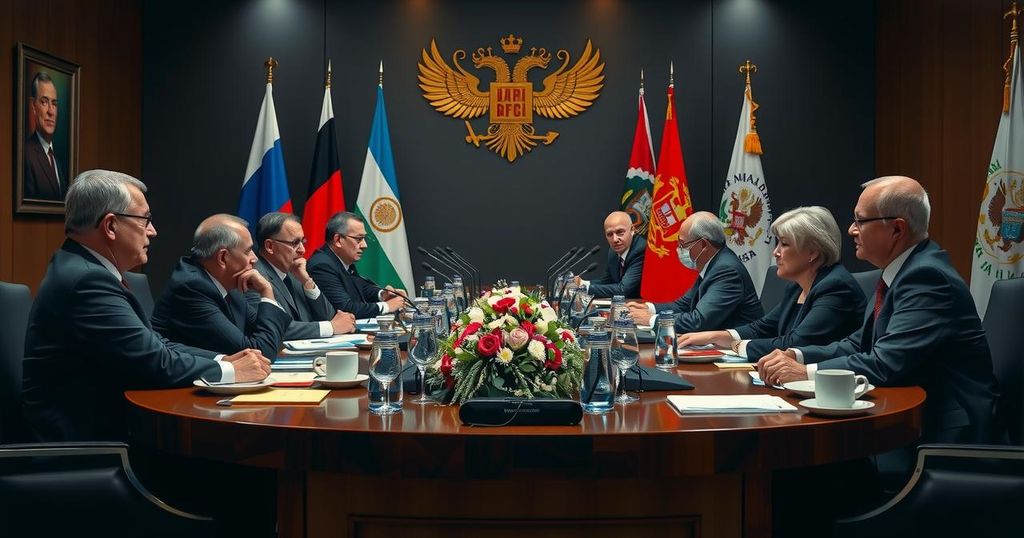Putin Hosts Brics Summit with Global Leaders Amidst Geopolitical Tensions

President Vladimir Putin hosted the largest Brics summit to date, welcoming 36 world leaders, including key figures from China, India, and Iran. The summit reflects Russia’s attempt to reinforce its global standing amidst allegations of war crimes and Western sanctions. As Brics expands, it aims to create economic frameworks free from U.S. influence while grappling with ideological diversity among its members.
President Vladimir Putin of Russia welcomed 36 world leaders from various nations, including China, India, and Iran, to the Brics summit—a gathering intended to showcase Russia’s global relevance despite its isolation from Western countries. This summit, the largest hosted by Putin since the onset of the Ukraine conflict, aims to fortify the Brics coalition, which has expanded beyond its initial five members—Brazil, Russia, India, China, and South Africa—to include nations such as Egypt, the United Arab Emirates, Ethiopia, and Iran. The meeting is significant amid ongoing geopolitical tensions and sanctions against Russia, particularly the warrants issued by the International Criminal Court (ICC) related to the abduction of Ukrainian children. The agenda of the summit included crucial bilateral discussions, with Putin scheduled to meet individually with leaders such as Xi Jinping from China and Narendra Modi from India, along with 15 other bilateral meetings. This gathering presents an opportunity for the Brics group to position itself as a counterbalance to the hegemony of Western powers, particularly the United States and the dominance of the dollar in global trade. Iranian President Masoud Pezeshkian highlighted this potential, stating, “Brics can be a way out of American totalitarianism and create a path of multilateralism.” However, the growing membership could pose challenges related to maintaining ideological coherence within the group, as nations like India and Brazil pursue diplomatic and economic independence from the dollar without fully subscribing to anti-Western rhetoric. Brazil’s President Luiz Inácio Lula da Silva emphasized that Brics is “not against anyone,” demonstrating the diverse motivations within the coalition. Notably, the UN Secretary-General António Guterres’ potential attendance at the summit remains uncertain, though Moscow claims he intends to participate. His presence could signal a nuanced shift in international relations, given the context of previous abstentions by Brics members concerning resolutions supporting Ukraine’s territorial integrity after Russia’s 2014 annexation of Crimea and the 2022 invasion. Notably, Putin’s participation in this summit marks a stark contrast to his absence from the previous Brics meeting in Johannesburg, where his ICC warrant would have necessitated arrest. Amid speculations about a potential resurgence of Donald Trump in U.S. politics, which could affect international dynamics surrounding the conflict in Ukraine, Putin’s outlook may increasingly reflect optimism about global political shifts. Additionally, the Brics+ alliance is not solely focused on political alliances but aims to develop economic frameworks that are less susceptible to U.S. sanctions, thereby rendering greater global influence.
The Brics summit is a significant international event, highlighting Russia’s efforts to strengthen its global alliances in light of increasing isolation from Western nations. The coalition, comprising emerging powers, aims to provide a counterweight to Western economic dominance, particularly concerning the U.S. dollar’s influence in global trade. The backdrop of geopolitical tensions surrounding the Ukraine conflict and sanctions against Russia sets the stage for this gathering. The summit’s expansion into a broader coalition emphasizes its ambition to reshape the current international order, despite underlying ideological differences among its members. This meeting is particularly noteworthy given the ICC issuance of a warrant for President Putin’s arrest regarding war crimes in Ukraine, indicating the complex interplay of diplomacy and accountability within this framework. Moreover, the potential presence of influential leaders like the UN Secretary-General could signify shifts in global diplomatic alignments. The Brics group, while aiming for a unified front against Western pressure, confronts the inherent challenge of maintaining cohesion amid varying national interests and political goals.
The Brics summit hosted by President Putin signifies a pivotal moment for Russia to assert its influence amidst Western isolation. With 36 leaders in attendance, the meeting reflects a growing coalition of nations aiming to challenge Western economic dominance and seek alternative systems to mitigate U.S. sanctions. The varying degrees of resistance against dollar hegemony and the collective aspiration for multilateralism underscore the complexities of alliance-building in a multipolar world. As these dynamics unfold, the summit may further impact international politics, particularly concerning the ongoing conflict in Ukraine and broader geopolitical strategies shaping the future of global relations.
Original Source: www.theguardian.com








